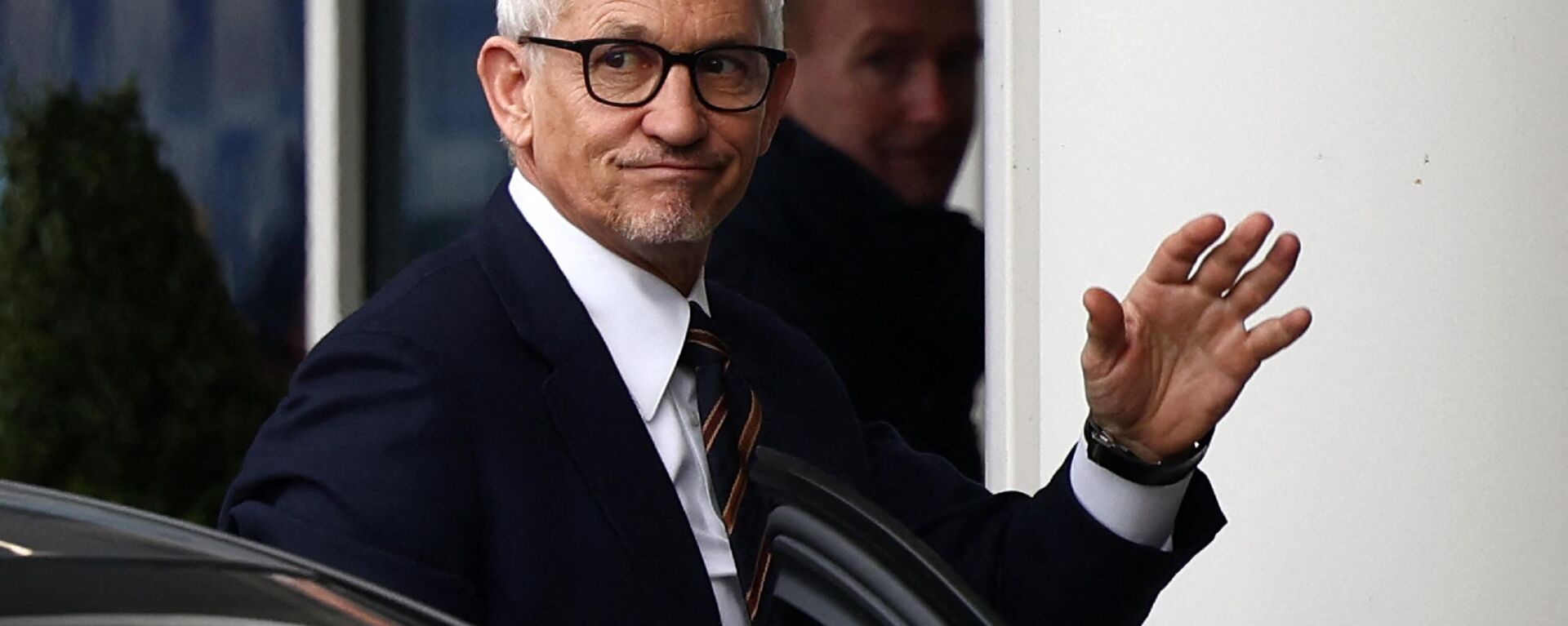BBC's Bias Laid Bare Anew Amid Linekergate Row
18:49 GMT 12.03.2023 (Updated: 18:58 GMT 12.03.2023)

© AFP 2023 / Carl Court
Subscribe
Veteran football presenter and ex-professional footballer Gary Lineker was suspended by the British Broadcasting Corporation on Friday after a much-publicized Twitter spat with the government over its asylum policy. How does the scandal square with the BBC’s much-touted claims of "impartiality", and with similar scandals of years and decades past?
Gary Lineker's broadcasting career was put on hold this week after he sharply attacked the government’s proposed policy on small boat migration by comparing it to the policies of 1930s Nazi Germany.
Whatever one may think of his remarks, and London’s approach to dealing with the ongoing illegal immigration crisis facing Britain, the reaction of the BBC’s brass is revealing, given that Lineker was hired not for his political views, expressed privately on social media, but his knowledge of the game of football. As one commentator astutely put it, going after Lineker is comparable to attacking BBC food critic Prue Leith because she once admitted to voting for Brexit.
The difference between Lineker and Leith seems to be that the ex-footballer’s remarks were a sharp criticism of the ruling Tory government, while Mrs. Leith’s effectively amounted to an endorsement.
Wave after wave of high profile Tory politicians lined up to reprimand Lineker this week, with Home Secretary Suella Braverman calling his comments “disappointing” and “unhelpful,” while Party deputy chairman Lee Anderson asked whether “this is the type of comment [the BBC] expect from their publicly funded presenters.”
Impartiality Façade
While the BBC has long prided itself on the “impartiality” it says is “fundamental to our reputation, our values and the trust of audiences,” the broadcaster apparently followed Anderson’s advice, first “reminding” Lineker “of his responsibilities,” and ultimately suspending him until “an agreed and clear position on his use of social media” could be reached.
The BBC’s employee guidelines don’t restrict staff from “engag[ing] in social media activities if they wish,” but asks those who are “clearly identified with the BBC and/or discuss[ing] their work…behave appropriately and in ways that are consistent with the BBC’s editorial values and policies.” Employees are asked to refrain from expressing political preferences or views on policy issues, a rule which sparked a backlash for tamping down on free expression when it was first implemented in 2020.
But Lineker’s case is more complex. Not only is he a freelance broadcaster, rather than a permanent staff member, but all the work he does for the corporation is related to football, not presenting the news or discussing politics on air. In fact, apart from a pair of ostentatious Ukrainian flag-themed hearts, his Twitter profile offers no clues of his employment for the BBC. “Once kicked a ball about. Now talk about kicking a ball about,” his simple Twitter bio reads.
But the Lineker row certainly isn’t the first time the “impartial” and “non-partisan” broadcaster has been caught in a scandal over perceived bias. In a sense, his suspension offers Britons a fresh opportunity to witness the disconnect between the BBC’s self-professed neutrality, fairness, objectivity and political non-bias and an extensive history of bending at the knee to party, state, corporate and even royal interests going all the way back to its creation in 1927.
Focusing therefore on just a few of the latest examples of biased coverage:
In October 2022, British Hindus protested outside the broadcaster’s London headquarters over “anti-Hindu and anti-India bias” over its coverage of unrest in Leicester between Hindu and Muslim groups.
Last April, readers couldn’t help but feel a “slight bias” in the broadcaster’s reporting after it labeled late Russian opposition leader Vladimir Zhirinovsky “Putin’s ultranationalist ally and clown.”
In February of 2022, a BBC anchor’s neutrality in covering the crisis in Ukraine was called into question after a Ukrainian official told him that he was overwhelmed with emotion after seeing “European people with blue eyes and blonde hair being killed.”
China banned BBC World News from the airwaves in the Asian nation in 2021 for spreading “fake news” about the coronavirus crisis and the treatment of ethnic minorities. The broadcaster vociferously protested, although ironically, Britain’s own telecom regulator had then recently banned China Global Television Network (CGTN) due to its purported control by the Chinese Communist Party.
Going further back nets reams of evidence of systemic biases, from systematic efforts to block to cover up stories that could embarrass the Royal Family, to the broadcaster’s rabid riling up support for the 2003 invasion of Iraq by feeding audiences UK and US government propaganda, including pushing the lie that Saddam Hussein has weapons of mass destruction. In fact, nearly all of the West’s ‘democracy at the barrel of a gun’ interventions, from Libya to the dirty war in Syria have been treated in a similar manner, with the broadcaster not only regurgitating government talking points, but in some cases even covering up evidence by its own reporters of false flag incidents.
The good news is that Brits generally don’t buy into the broadcaster’s impartiality claims, and haven’t for many years, with a 2018 poll by BMG Research finding that just 37 percent of respondents felt the broadcaster was impartial. In 2021, the BBC was slapped with over 462,000 complaints of “perceived bias,” up from about 218,000 in the 2018-2019 period.
The broadcaster’s partiality is exemplified in the cult-1980s political hit series Yes Minister, where the details about the tools that the government and civil service bureaucracy have at their disposal in pressuring the 'impartial' broadcaster’s executives into submission are laid bare with diabolical comedic flair.
“The BBC cannot give in to Government pressure.”
— Michael Warburton (@MichaelWarbur17) March 11, 2023
YES MINISTER (1982) #NigelHawthorne #PaulEddington #MorayWatson #AntonyJay #JonathanLynn pic.twitter.com/aVMp4UPSgB
It’s one of those ironies of history then that the series itself was produced by the BBC. Or perhaps they were trying to tell us something.


